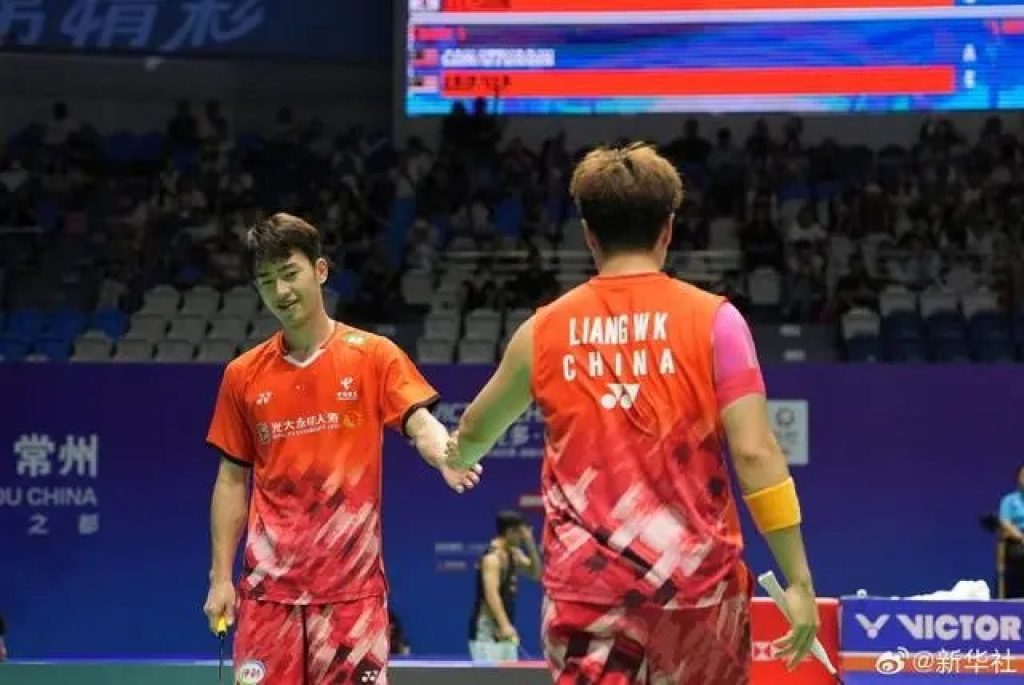After securing the silver medal at the Paris Olympics, Liang Weikeng/Wang Chang’s popularity has steadily increased. From achieving the Olympic silver to participating in cross-industry activities and then making a fresh start, the different experiences have brought much growth to these young athletes. However, they remain clear that athletes can only realize their greatest value on the court, and serving the country remains their unchanging mission.
From Overcoming Setbacks to Perfect Synchronization
Many people know the story of how Liang Weikeng/Wang Chang soared from 444th place to world No. 1 in just 16 months, embodying the essence of perfect synchronization. However, both athletes have faced their own setbacks, and it was during these low points that they became stronger and more appreciative of their victories on the court.

Born in 2001, Wang Chang was the runner-up in the men’s doubles at the 2017 World Junior Championships and the champion at the 2018 World Junior Championships. But after joining the national team, Wang hit a low point, often exiting in the first round with his partner. During this tough period, Wang doubted himself but reminded himself not to rush, knowing that many top players struggled when first transitioning to senior-level tournaments. “After experiencing it, things will gradually improve,” he told himself.
Born in 2000, Liang Weikeng faced multiple defeats after joining the national first team in 2019, severely shaking his confidence and leading to a halt in his training progress. At the end of 2020, Liang was sent back to the newly formed national training team. Motivated by this setback, he decided to start fresh. In one month, he lost 13 kilograms, and by December 2021, he performed exceptionally well in internal competitions, earning his way back to the first team.
In 2022, the national team reshuffled the men’s doubles pairs, bringing together these two previously frustrated but cheerful young players. Starting in May of that year, Liang Weikeng/Wang Chang began competing together, and their collaboration quickly clicked. Wang Chang’s sharp net play combined with Liang Weikeng’s powerful backcourt smashes led them to multiple championship victories, steadily boosting their world ranking.

The Paris Olympics marked their debut on the Olympic stage. They were eager to see the national flag raised and hear the anthem played. But during preparation, they encountered common challenges faced by young athletes. “We were in peak form at first, but after the initial excitement passed, physical fatigue set in,” Liang Weikeng explained. To move more freely on the court and protect his previously injured ankle, Liang embarked on a tough weight-loss journey starting in December of last year. “In the hot March of Lingshui, Hainan, after each training session, I ran in a weight-loss suit in over 30-degree heat,” Liang said. He successfully dropped from 88 kilograms to 77 kilograms.
“He shares his body metrics in the group chat,” Wang Chang said, noting that his partner’s positive changes also motivated him to look inward and address his own weaknesses. “I watch videos of my matches from six months ago, analyzing my progress and shortcomings.” Watching his own match footage has become Wang’s hobby.
Approaching their first Olympics, Liang and Wang maintained a mindset of both ambition and enjoyment. “We must play boldly and give our all on the court,” they set as their goal before the games. In the end, they won the silver medal.
Though losing the final left them feeling down momentarily, the young pair quickly reset their focus on the next four-year cycle.
A New Start in the New Cycle
Last week’s China Open was Liang Weikeng/Wang Chang’s first competition after the Paris Olympics, where they lost 1-2 to the Indonesian pair Fikri/Maulana, exiting in the round of 16.

During the match, Liang and Wang led the Indonesian pair 14-12 in all three games, but couldn’t handle the crucial moments well enough to secure victory. “We didn’t manage our serve reception well. Their serves in the wind-assisted zone were more comfortable, and our connection between the serve reception and the third shot wasn’t smooth,” Wang explained regarding their loss after leading in the deciding game. The competition in the men’s doubles field is particularly fierce right now. Even before the Paris Olympics, Liang Weikeng/Wang Chang, despite being ranked No. 1, didn’t hold a clear advantage over other top-ten pairs, with many matches coming down to performance on the day.
Having experienced the Olympics, Liang Weikeng/Wang Chang understand the increased expectations for them to perform well. But after a one-month break, they’re clearly not yet back to their Olympic form. Recovery will take time, and they will face more challenges along the way.

Leave a Reply